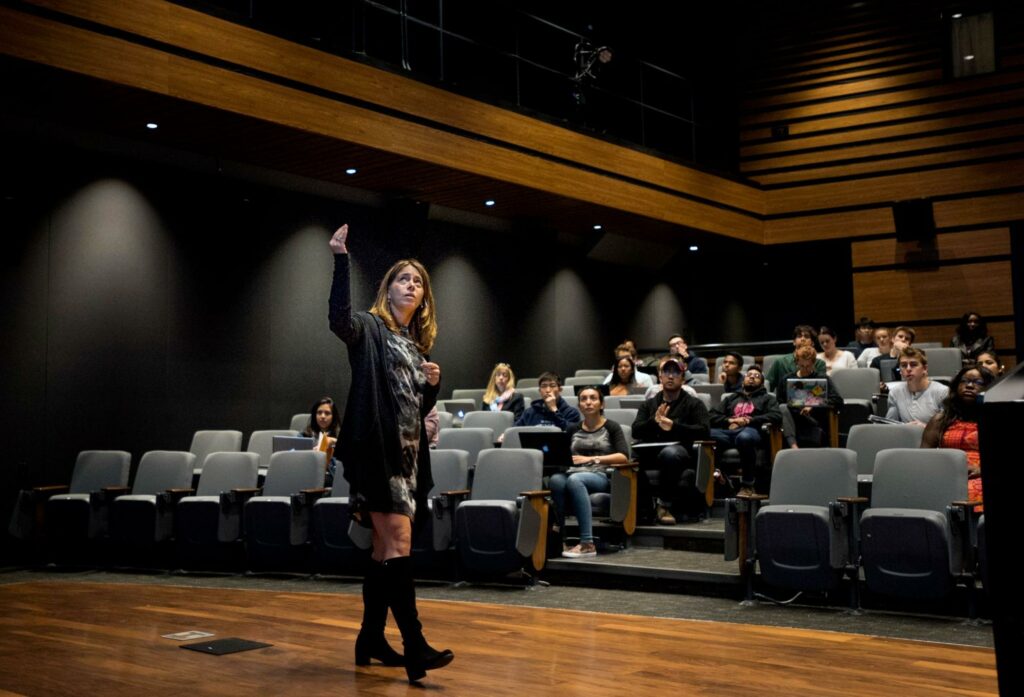About the Committee on the Environment, Climate Change, and Sustainability
Established in 2017, the President’s Advisory Committee on the Environment, Climate Change, and Sustainability (CECCS) was one of 14 recommendations put forth by the president in a 2016 report focused on taking decisive action against climate change.
Since then, the committee of faculty, staff, students and alumni has become the central steward of institutional initiatives to help advance sustainability and climate solutions at the University of Toronto.
Staff at the CECCS Secretariat provide support to the committee and are responsible for the planning, coordination and implementation of sustainability activities and initiatives with partners, both on and off campus.

Our Vision
Sustainability is more than a subject area of discipline. It is a cross-cutting framework, ethic and key component of the U of T identity. Proactive and practical in the face of immense challenges, we promote a vision of sustainability that is hopeful, inclusive and regenerative.


Our Mission
Through enhanced integration of academic and operational sustainability, unite our local and global communities to catalyze public good and chart a responsive, practical path toward a more sustainable future–forged by urgency, bold ideas and collective action–for generations to come.
Learn more about CECCS
Organizational Framework
Terms of Reference
Our Impact
Select Publications
View some articles below that reference our work.
Odd couples: reconciling academic and operational cultures for whole-institution sustainability governance at universities. Journal of International Sustainability in Higher Education, 2023.
Odd couples: reconciling academic and operational cultures for whole-institution sustainability governance at universities. Journal of International Sustainability in Higher Education, 2023.
This study aims to explore barriers and pathways to a whole-institution governance of sustainability within the working structures of universities.
Reaching the Rest: Embedding Sustainability in Undergraduate Student Learning. Journal of Integrative Environmental Sciences, 2022.
Reaching the Rest: Embedding Sustainability in Undergraduate Student Learning. Journal of Integrative Environmental Sciences, 2022.
In this paper, we examine the University of Toronto’s introduction of a new model of sustainability learning and evaluate it against the themes and recommendations found in the literature. This model aims to establish university-wide sustainability learning trajectories, called Sustainability Pathways whose novelty is in its offer to reach many more students than other approaches.
Expanding Student Engagement in Sustainability: Using SDG-and CEL-Focused Inventories to Transform Curriculum at the University of Toronto. Sustainability, 2019.
Expanding Student Engagement in Sustainability: Using SDG-and CEL-Focused Inventories to Transform Curriculum at the University of Toronto. Sustainability, 2019.
The Expanded Student Engagement Project (ESE) has developed three comprehensive inventories which aim to increase student knowledge of sustainability-related course content and increase student engagement in on- and off-campus, curricular, and non-curricular sustainability projects at the University of Toronto (U of T).
Our Subcommittee Work
CECCS activity is organized into four subcommittees: teaching and learning, research, operations and student leadership.

Teaching & Learning
We support the development and delivery of sustainability programming, course curriculum and experiential education to almost 80,000 undergraduate students.
Research
We foster multi-, inter-, and trans-disciplinary connections and collaborations among expert faculty across our campuses, promote the research excellence of sustainability related research units and Institutional Strategic Initiatives and help underscore sustainability standards for research conduct.


Operations
We facilitate sustainability projects that bring together faculty, staff, students and external partners that use our campuses as test beds for operational and academic activities. We also demonstrate global leadership in sustainability standards through signature projects, tri-campus operational collaboration and coordination.
Student Leadership
We amplify student voices in CECCS activity and help drive student-led sustainability initiatives.

Adams Sustainability Celebration
Thanks to the generosity of Wendy Adams, the CECCS hosted the Adams Sustainability Celebration from 2020 to 2023. This event series celebrated U of T’s sustainability successes through faculty, staff and student grants and deepened community engagement around sustainability through an innovation prize competition.

